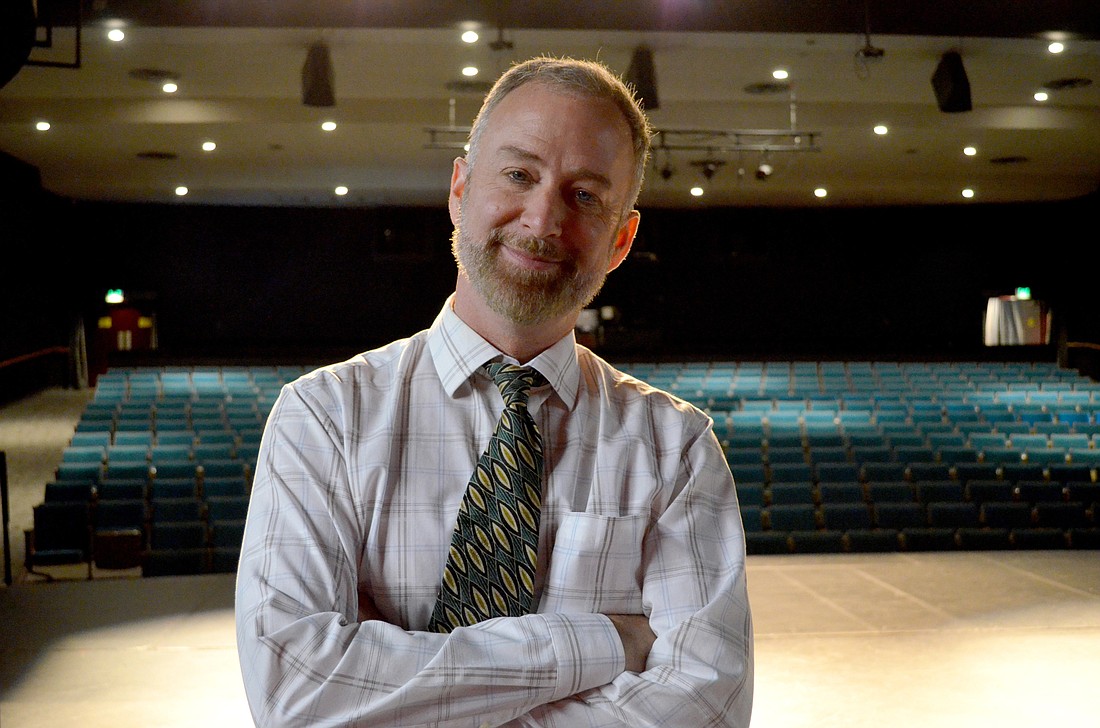- November 24, 2024
-
-
Loading

Loading

Pam Wiley stands unaccompanied, center stage under the bright spotlights at the Players Centre for Performing Arts.
She’s relaxed, confident and matter-of-fact as she dives into a story about what seems like a routine doctor’s visit. But, as it turns out, the circumstances are far from ordinary. As her monologue reveals, she’d just undergone a mastectomy, and she was feeling awful.
Or in her words, like she’d been “towed into a chop shop to be used for spare parts.”
With her dry humor, she insists she raised her children not to swear, but when this doctor — with his irritatingly minty breath — had the nerve to tell her how lucky a woman she was, she just couldn’t hold her tongue.
Her calm demeanor snaps sharply as she re-enacts her expletive-laden outburst.
She relaxes again.
“I said I was sorry,” she says, her exaggerated gestures betraying a hint of sarcasm.
The story isn’t her own. But as Artistic Director Jeffery Kin will tell you, Wiley channels his mother pretty effectively.
The story is one of 60 one-minute plays and performances that make up “Got A Minute?” 60-Second Play Festival — an endeavor Kin launched in 2005 as a cancer benefit after learning his mother was diagnosed with breast cancer.
“I went with her to her appointment” he says. “The doctor wasn’t the friendliest, and I made a joke about it. So we had this moment where she was getting the worst news of her life, but we were laughing together. I went home and wrote that into a play, and that started the first “Got A Minute?”
Kin and Wiley, both directors in the festival, along with a volunteer team of actors, directors and other Players staff hosted the annual cancer fundraiser for five years, raising $125,000 for cancer nonprofits along the way.
In 2010, the magnitude of the production took its toll, and ‘Got A Minute?’ went on hiatus. Kin says he always planned to bring it back — when the time was right.
Earlier this year, he learned Players Director of Operations Jolie Schroeder was diagnosed with breast cancer. He knew it was time to revive the festival.
This year, in addition to raising funds for Schroeder’s medical expenses, the festival will also benefit American Cancer Society’s Relay For Life and St. Petersburg-based cancer nonprofit Rob’s Rescue.
At a recent rehearsal, Kin is standing near the front of the stage, watching as actors run through the plays. A man — not so coincidentally dining at his co-worker’s favorite coffee shop — spots his love interest as she walks in. The interest is clearly not mutual.
Kin watches intently before offering his notes.
“When you ask her out, why don’t you push the empty chair toward her with your foot?” he suggests. The couple runs the scene again. It’s funnier.
A 60-second play might sound easier than its full-length counterpart. Fewer lines. Less to memorize. Easy, right?
“It’s surprisingly hard,” says Kin. “Every second counts. Every word counts — every action. When you’re this limited in your performance, everything carries so much more weight. You don’t have time to ramp into a character. The scene starts, and you’re it.”
A 60-second play still needs everything a full-length one does. There needs to be a beginning, a conflict and resolution and an end. All within a minute. It’s no small task.
One of the tricks, Kin says, is to focus on behavior. Find an activity that’s revealing, both of a character’s personality and of the story, and the passion will show through.
“That’s my role as director,” he says. “These stories are so quick, it’s easy to get caught up in your lines and realize the story isn’t making common sense. As an actor, if you have an activity, it opens things up to flow so much more naturally.”
It’s the little things that make the difference. When a woman sits down at a mirror to deliver a monologue, logically, why would she be there? Throw in some makeup application, and the whole thing feels much more real. When two dogs meet at a park, where are their owners? A mimed leash tug implies the answer — and brings it to life.
But beyond the challenges, there’s a certain charm to a short, sweet story.
“Sometimes it’s better that way,” says Kin. “It doesn’t take much to tell a story. Mark Twain was able to encapsulate a lot in three sentences. Sometimes, bigger is not better.”
Organizing a festival like this takes a lot of work, especially on a volunteer basis. Kin, Pam Wiley and Sara Logan are directors, working with a dozen actors to stage the 60 performances — a mix of 30 previously performed works and 30 new submissions chosen from a national call.
The Players Flash Tappers will bring the festival’s traditional song-and-dance element with six one-minute performances.
But Kin says the work is well worth it. The evening is about entertainment, but it’s also about hope. Blue skies and clouds are repeated in the festival’s motif as a nod to the theme. The majority of the plays are lighthearted and leave attendees feeling uplifted.
For Kin, it’s about doing his part and using his skills to help others.
“I truly believe that’s what we’re put on this planet to do,” he says. “We’re supposed to do good for other people. I’m a theater person — this is my way of doing that.”